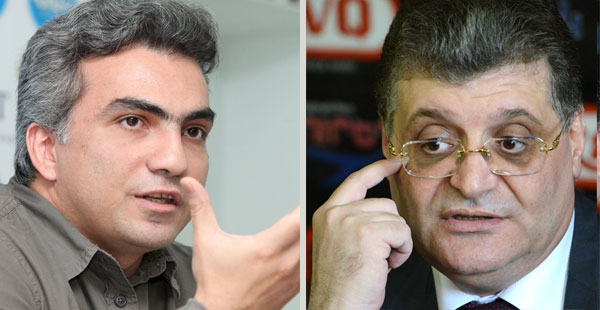“My political knowledge doesn’t suffice to understand Raffi Hovhannisyan’s political plans and actions,” Aram Karapetyan, the New Times Party (NTP) leader said in response to a question of www.aravot.am what Raffi Hovhannisyan’s next step would be, in his opinion. We inquired whether what had happened on April 9 was in line with democracy and the rule of law, Mr. Karapetyan said: “It is absurd to talk about the rule of law in Armenia, because the system operates not based on the law, but based on hierarchic nepotism underlain by one’s own nepotistic interests. It is inappropriate to talk about democracy in a country, where no political elections are held.” Edgar Vardanyan, an expert of the Armenian Center for National and International Studies (ACNIS), pointed out during a conversation with us what probable scenarios and assumptions stemmed from the swearing-in of “New Armenia.” He went into detail: “The philosophy of the struggle has actually been presented. It is a philosophy of civil disobedience. Therefore, such actions should be taken that are included in the complex of actions that stem from the philosophy of civil disobedience. I can assume that there will be such actions that will create an atmosphere of non-cooperation with the authorities in all of Armenia. It is logical that in order to create, there should be continuous protests – marches, demonstrations, pickets – which also suggest passive resistance, when citizens don’t take violent actions, don’t attack the police during those events, don’t smash anything into pieces, don’t take aggressive attitude, but carry their protest through. Here the authorities are actually put under psychological pressure, and on the other hand, a task is undertaken to influence society’s mind through those actions, in order that those parts of society that have taken no notice of the process so far see that one cannot reconcile oneself to this situation.” In response to our question how disappointment among society that had been much talked about after April 9 had to be overcome, Mr. Vardanyan said: “I think that if there are well-organized, continuous and widespread protests, it can be considered a means to overcome disappointment in itself. People will see that there are specific actions, will join, thinking: ‘What are we disappointed with, after all?’ It should be clear to the public what underlies this or that decision, how that decision has been made. This should be clarifies. I assume that at this stage of the struggle, it will be necessary to revise the organization, the format of the movement, since this is the very thing that causes many problems.”
Tatev HARUTYUNYAN



















































